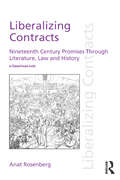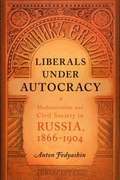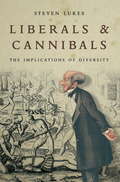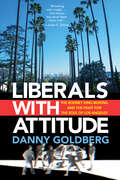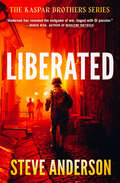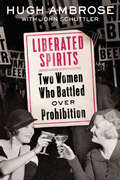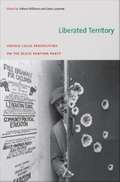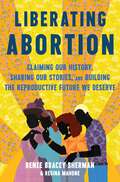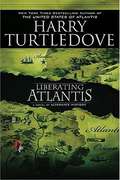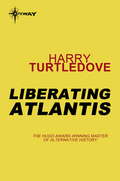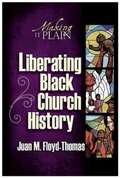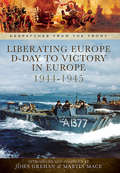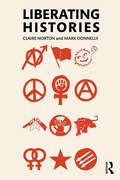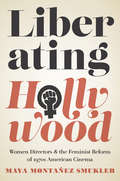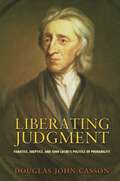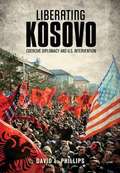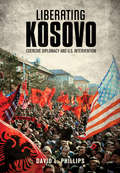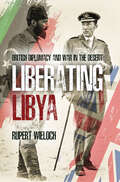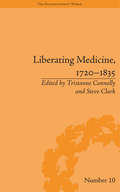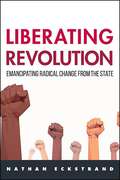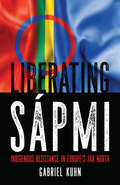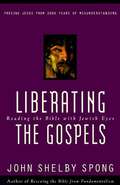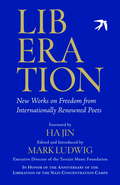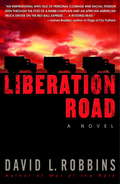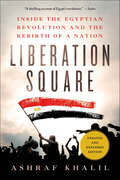- Table View
- List View
Liberalizing Contracts: Nineteenth Century Promises Through Literature, Law and History
by Anat RosenbergIn Liberalizing Contracts Anat Rosenberg examines nineteenth-century liberal thought in England, as developed through, and as it developed, the concept of contract, understood as the formal legal category of binding agreement, and the relations and human practices at which it gestured, most basically that of promise, most broadly the capitalist market order. She does so by placing canonical realist novels in conversation with legal-historical knowledge about Victorian contracts. Rosenberg argues that current understandings of the liberal effort in contracts need reconstructing from both ends of Henry Maine's famed aphorism, which described a historical progress "from status to contract." On the side of contract, historical accounts of its liberal content have been oscillating between atomism and social-collective approaches, missing out on forms of relationality in Victorian liberal conceptualizations of contracts which the book establishes in their complexity, richness, and wavering appeal. On the side of status, the expectation of a move "from status" has led to a split along the liberal/radical fault line among those assessing liberalism's historical commitment to promote mobility and equality. The split misses out on the possibility that liberalism functioned as a historical reinterpretation of statuses – particularly gender and class – rather than either an effort of their elimination or preservation. As Rosenberg shows, that reinterpretation effectively secured, yet also altered, gender and class hierarchies. There is no teleology to such an account.
Liberals Under Autocracy
by Anton A. FedyashinWith its rocky transition to democracy, post-Soviet Russia has made observers wonder whether a moderating liberalism could ever succeed in such a land of extremes. But inLiberals under Autocracy, Anton A. Fedyashin looks back at the vibrant Russian liberalism that flourished in the country’s late imperial era, chronicling its contributions to the evolution of Russia’s rich literary culture, socioeconomic thinking, and civil society. For five decades prior to the revolutions of 1917,The Herald of Europe(Vestnik Evropy) was the flagship journal of Russian liberalism, garnering a large readership. The journal articulated a distinctively Russian liberal agenda, one that encouraged social and economic modernization and civic participation through local self-government units (zemstvos) that defended individual rights and interests-especially those of the peasantry-in the face of increasing industrialization. Through the efforts of four men who turnedThe Heraldinto a cultural nexus in the imperial capital of St. Petersburg, the publication catalyzed the growing influence of journal culture and its formative effects on Russian politics and society. Challenging deep-seated assumptions about Russia’s intellectual history, Fedyashin’s work casts the country’s nascent liberalism as a distinctly Russian blend of self-governance, populism, and other national, cultural traditions. As such, the book stands as a contribution to the growing literature on imperial Russia's nonrevolutionary, intellectual movements that emphasized the role of local politics in both successful modernization and the evolution of civil society in an extraparliamentary environment.
Liberals and Cannibals: The Implications of Diversity
by Steven LukesWith debates on the meaning of 'liberal society' more heated than ever, this is a timely re-issue of a classic textCan the tension between relativism and the moral universalism current in contemporary politics be resolved within the framework of liberalism? How is liberal society to interpret the diversity of morals? Is pluralism the appropriate response? How does pluralism differ from the widely condemned ethnocentric relativism -'liberalism for the Liberals, cannibalism for the cannibals'?Confronting liberal thought with its own limitations, Steven Lukes' work is more relevant than ever. While recognizing the dangers of moral imperialism, Lukes argues that a relativist position based on identifying clearly distinct cultural and moral communities is incoherent. Drawing on work in anthropology and philosophy, he examines the nature of social justice, the politics of identity and human rights theory.From the Trade Paperback edition.
Liberals with Attitude: The Rodney King Beating and the Fight for the Soul of Los Angeles
by Danny GoldbergThe dramatic and captivating story of an unlikely coalition that formed in the wake of the Rodney King beating to challenge the destructive reign of Los Angeles police chief Daryl Gates LIBERALS WITH ATTITUDE DOCUMENTS THE SIXTEEN MONTHS IN 1991–92 between the brutal beating of Rodney King by four police officers that was captured on a home video camera and the resignation of LAPD chief Daryl Gates. Gates was reviled by the local Black and civil liberties communities because of the pattern of racism and brutality in the department, and he was uniquely powerful because of the structure of the Los Angeles City Charter and the secret files he kept on local politicians. The effort to get Gates to step down after thirteen years as chief and to amend the City Charter to prevent another unaccountable chief from amassing that much power was led by Los Angeles mayor Tom Bradley, a former LAPD officer and the first Black mayor of the city. To overcome Gates’s entrenched power, Bradley assembled a team that included future US secretary of state Warren Christopher, the local ACLU, Congresswoman Maxine Waters, and activists who saw the struggle against Gates as an important chapter in the civil rights movement. Much of the local media, especially the Los Angeles Times, was supportive of Bradley’s agenda, as was the burgeoning "gangsta rap" culture of LA, much of which emerged in reaction to the LAPD. Author Danny Goldberg was the chair of the ACLU Foundation of Southern California during those years and was personally acquainted with the leaders of the fight against Gates. He interviewed several dozen people who are still alive and got access to thousands of pages of documents among the papers of Stanley Sheinbaum, who was married to the heiress of the Warner Bros. film fortune. Sheinbaum was chosen by Mayor Bradley to be the president of the Los Angeles Police Commission, with the specific mission of getting Gates out of office. Goldberg’s insider saga demonstrates that cooperation between the political left and center is required to overcome white grievance and unaccountable power.
Liberated (The Kaspar Brothers)
by Steve AndersonAn American captain in post-WWII Germany must stop a criminal conspiracy by his fellow officers in this historical thriller by the author of The Losing Role. Germany, May, 1945. With the war just over, Capt. Harry Kaspar is about to take a new posting in the US occupation—running a Bavarian town named Heimgau. When Harry loses the command to a rival, he&’ll do almost anything to win the job back. Then Harry discovers a horrific scene: three German men tortured and murdered. Solving the crime could teach the locals about American justice—and help him reclaim his posting. But as Harry&’s quest for the killer leads him back to American officers, he uncovers a criminal network plundering the war-torn land for all its worth. Now, for justice to mean anything at all, Harry must fight back.
Liberated Spirits: Two Women Who Battled Over Prohibition
by Hugh Ambrose John SchuttlerA provocative new take on the women behind a perennially fascinating subject--Prohibition--by bestselling author and historian Hugh Ambrose.The passage of the 18th Amendment (banning the sale of alcohol) and the 19th (women's suffrage) in the same year is no coincidence. These two Constitutional Amendments enabled women to redefine themselves and their place in society in a way historians have neglected to explore. Liberated Spirits describes how the fight both to pass and later to repeal Prohibition was driven by women, as exemplified by two remarkable women in particular. With fierce drive and acumen, Mabel Willebrandt transcended the tremendous hurdles facing women lawyers and was appointed Assistant Attorney General. Though never a Prohibition campaigner, once in office she zealously pursued enforcement despite a corrupt and ineffectual agency.Wealthy Pauline Sabin had no formal education in law or government but she too fought entrenched discrimination to rise in the ranks of the Republican Party. While Prohibition meant little to her personally--aristocrats never lost access to booze--she seized the fight to repeal it as a platform to bring newly enfranchised women into the political process and compete on an equal footing with men.Along with a colorful cast of supporting characters, from rumrunners and Prohibition agents on the take to senators and feuding society matrons, Liberated Spirits brings the Roaring Twenties to life in a brand new way.
Liberated Territory: Untold Local Perspectives On the Black Panther Party
by Jama Lazerow Yohuru WilliamsWith their collection In Search of the Black Panther Party, Yohuru Williams and Jama Lazerow provided a broad analysis of the Black Panther Party and its legacy. In Liberated Territory, they turn their attention to local manifestations of the organization, far away from the party's Oakland headquarters. This collection's contributors, all historians, examine how specific party chapters and offshoots emerged, developed, and waned, as well as how the local branches related to their communities and to the national party. The histories and character of the party branches vary as widely as their locations. The Cape Verdeans of New Bedford, Massachusetts, were initially viewed as a particular challenge for the local Panthers but later became the mainstay of the Boston-area party. In the early 1970s, the Winston-Salem, North Carolina, chapter excelled at implementing the national Black Panther Party's strategic shift from revolutionary confrontation to mainstream electoral politics. In Detroit, the Panthers were defined by a complex relationship between their above-ground activities and an underground wing dedicated to armed struggle. While the Milwaukee chapter was born out of a rising tide of black militancy, it ultimately proved more committed to promoting literacy and health care and redressing hunger than to violence. The Alabama Black Liberation Front did not have the official imprimatur of the national party, but it drew heavily on the Panthers' ideas and organizing strategies, and its activism demonstrates the broad resonance of many of the concerns articulated by the national party: the need for jobs, for decent food and housing, for black self-determination, and for sustained opposition to police brutality against black people. Liberated Territory reveals how the Black Panther Party's ideologies, goals, and strategies were taken up and adapted throughout the United States. Contributors: Devin Fergus, Jama Lazerow, Ahmad A. Rahman, Robert W. Widell Jr. , Yohuru Williams
Liberating Abortion: Claiming Our History, Sharing Our Stories, and Building the Reproductive Future We Deserve
by Renee Bracey Sherman Regina MahoneA galvanizing history of abortion recentering people of color to put forth a timely argument that we must liberate abortion for all.People of color have been having abortions since the dawn of time, yet our access is continuously under attack. In Liberating Abortion, award-winning abortion activist Renee Bracey Sherman and journalist Regina Mahone illustrate the long racist history that brought us to this moment, uncover the hidden figures who set the foundation activists and storytellers are building on today, and explain how abortion has been and remains essential to the health of our communities.Liberating Abortion will take you back to the basics of sex education, detailing the traditions of abortion over centuries , while examining how society makes us feel about our experiences. You’ll find rigorous research, never-before-heard stories, and eye-opening interviews with over 50 people of color who’ve had abortions, including activists, actresses, television writers, politicians, and the two Black members of Jane, the Chicago feminist service that provided abortions before Roe. With poignant storytelling and precise analysis, Liberating Abortion will change how you think about abortion forever.
Liberating Atlantis
by Harry TurtledoveFrederick Radcliff is a descendent of the family that founded Atlantis's first settlement. But he is also a slave. And when fate presents him with the opportunity to throw off his shackles once and for all, he becomes the leader of a revolutionary army of slaves determined to free all of his brethren across Atlantis. .
Liberating Atlantis
by Harry TurtledoveFrederick Radcliff is a descendant of the family that founded Atlantis's first settlement, and his grandfather Victor led the army against England to win the nation's independence. But he is also a black slave, unable to prove his lineage and forced to labour on a cotton plantation in the southern region of the country. Frederick feels the colour of his skin shouldn't keep him from having the same freedom his ancestors fought and died to win for themselves. And when fate presents him with the opportunity to throw off his shackles once and for all, he becomes the leader of a revolutionary army of black and red slaves determined to free all of his brethren across Atlantis.
Liberating Black Church History: Making It Plain
by Juan M. Floyd-ThomasNo serious scholar in biblical studies today can introduce students to his or her field without taking into account the contributions of African American scholarship. The long traditions of biblical interpretation in the Black Church, and the innovative research and writing performed by African American scholars in recent years are now essential components of a critical study of the Bible.Up to now, knowing how best to introduce the fruits of African American biblical scholarship to students has been difficult. Good resources exist, yet too often they are not written with the needs of introductory students in mind. This book meets that need by providing an overview of the most important developments in African American approaches to biblical scholarship. It offers insight into the particular ways that African American scholarship has shaped the world of biblical study.
Liberating Europe: D-day To Victory In Europe 1944-1945 (Despatches from the Front)
by Martin Mace John GrehanDespatches in this volume include the Despatch on air operations by the Allied Expeditionary Air Force in North West Europe between November 1943 and September 1944, the despatch on the assault phase of the Normandy landings June 1944, despatch on operations of Coastal Command, Royal Air Force in Operation Overlord the invasion of Europe 1944, the despatch on operations in North West Europe between 6 June 1944 and 5 May 1945, by Field Marshal the Viscount Montgomery of Alamein, Commander 21st Army Group, the despatch on the final stages of the naval war in North West Europe, and, as an addition, the despatch on the Dieppe Raid in 1942.This unique collection of original documents will prove to be an invaluable resource for historians, students and all those interested in what was one of the most significant periods in British military history.
Liberating Histories: Truths, Power, Ethics
by Mark Donnelly Claire NortonLiberating Histories makes an original, scholarly contribution to contemporary debates surrounding the cultural and political relevance of historical practices. Arguing against the idea that specifically historical readings of the past are necessary or are compelled by the force of past events themselves, this book instead focuses on other forms of past-talk and how they function in politically empowering ways against social injustices. Challenging the authority and constraints of academic history over the past, this book explores various forms of past-talk, including art, films, activism, memory, nostalgia and archives. Across seven clear chapters, Claire Norton and Mark Donnelly show how activists and campaigners have used forms of past-talk to unsettle ‘common sense’ thinking about political and social problems, how journalists, artists, curators, filmmakers and performers have referenced the past in their practices of advocacy, and how grassroots archivists help to circulate materials that challenge the power of authorised institutional archives to determine what gets to count as a demonstrable feature of the past and whose voices are part of the ‘historical record’. Written in a lucid, accessible manner, and combining insightful critical analysis and philosophical argument with clear consideration of how different forms of past-talk influence the narration of pasts in a variety of socio-political contexts, Liberating Histories is essential reading for students and scholars with an interest in historiography and the ethical and political dimensions of the historical discipline.
Liberating Hollywood: Women Directors and the Feminist Reform of 1970s American Cinema
by Maya SmuklerLiberating Hollywood examines the professional experiences and creative output of women filmmakers during a unique moment in history when the social justice movements that defined the 1960s and 1970s challenged the enduring culture of sexism and racism in the U.S. film industry. Throughout the 1970s feminist reform efforts resulted in a noticeable rise in the number of women directors, yet at the same time the institutionalized sexism of Hollywood continued to create obstacles to closing the gender gap. Maya Montañez Smukler reveals that during this era there were an estimated sixteen women making independent and studio films: Penny Allen, Karen Arthur, Anne Bancroft, Joan Darling, Lee Grant, Barbara Loden, Elaine May, Barbara Peeters, Joan Rivers, Stephanie Rothman, Beverly Sebastian, Joan Micklin Silver, Joan Tewkesbury, Jane Wagner, Nancy Walker, and Claudia Weill. Drawing on interviews conducted by the author, Liberating Hollywood is the first study of women directors within the intersection of second wave feminism, civil rights legislation, and Hollywood to investigate the remarkable careers of these filmmakers during one of the most mythologized periods in American film history.
Liberating Judgment: Fanatics, Skeptics, and John Locke's Politics of Probability
by Douglas John CassonExamining the social and political upheavals that characterized the collapse of public judgment in early modern Europe, Liberating Judgment offers a unique account of the achievement of liberal democracy and self-government. The book argues that the work of John Locke instills a civic judgment that avoids the excesses of corrosive skepticism and dogmatic fanaticism, which lead to either political acquiescence or irresolvable conflict. Locke changes the way political power is assessed by replacing deteriorating vocabularies of legitimacy with a new language of justification informed by a conception of probability. For Locke, the coherence and viability of liberal self-government rests not on unassailable principles or institutions, but on the capacity of citizens to embrace probable judgment. The book explores the breakdown of the medieval understanding of knowledge and opinion, and considers how Montaigne's skepticism and Descartes' rationalism--interconnected responses to the crisis--involved a pragmatic submission to absolute rule. Locke endorses this response early on, but moves away from it when he encounters a notion of reasonableness based on probable judgment. In his mature writings, Locke instructs his readers to govern their faculties and intellectual yearnings in accordance with this new standard as well as a vocabulary of justification that might cultivate a self-government of free and equal individuals. The success of Locke's arguments depends upon citizens' willingness to take up the labor of judgment in situations where absolute certainty cannot be achieved.
Liberating Kosovo
by David L. PhillipsKosovo, after its incorporation into the Serbian Republic of Yugoslavia, became increasingly restive during the 1990s as Yugoslavia plunged into internal war and Kosovo's ethnic Albanian residents (Kosovars) sought autonomy. In March 1999, NATO forces began airstrikes against targets in Kosovo and Serbia in an effort to protect Kosovars against persecution. The bombing campaign ended in June 1999, and Kosovo was placed under transitional UN administration while negotiations on its status ensued. Kosovo eventually declared independence in 2008. Despite internal political tension and economic problems, the new nation has been recognized by many other countries and most of its inhabitants welcome its separation from Serbia. In Liberating Kosovo, David Phillips offers a compelling account of the negotiations and military actions that culminated in Kosovo's independence. Drawing on his own participation in the diplomatic process and interviews with leading participants, Phillips chronicles Slobodan Milosevic's rise to power, the sufferings of the Kosovars, and the events that led to the disintegration of Yugoslavia. He analyzes how NATO, the United Nations, and the United States employed diplomacy, aerial bombing, and peacekeeping forces to set in motion the process that led to independence for Kosovo. He also offers important insights into a critical issue in contemporary international politics: how and when the United States, other nations, and NGOs should act to prevent ethnic cleansing and severe human-rights abuses.
Liberating Kosovo: Coercive Diplomacy and U. S. Intervention (Belfer Center Studies in International Security)
by David L. PhillipsA compelling account of the diplomatic and military actions that led to Kosovo's independence and their implications for future U.S. and UN interventions.Kosovo, after its incorporation into the Serbian Republic of Yugoslavia, became increasingly restive during the 1990s as Yugoslavia plunged into internal war and Kosovo's ethnic Albanian residents (Kosovars) sought autonomy. In March 1999, NATO forces began airstrikes against targets in Kosovo and Serbia in an effort to protect Kosovars against persecution. The bombing campaign ended in June 1999, and Kosovo was placed under transitional UN administration while negotiations on its status ensued. Kosovo eventually declared independence in 2008. Despite internal political tension and economic problems, the new nation has been recognized by many other countries and most of its inhabitants welcome its separation from Serbia. In Liberating Kosovo, David Phillips offers a compelling account of the negotiations and military actions that culminated in Kosovo's independence. Drawing on his own participation in the diplomatic process and interviews with leading participants, Phillips chronicles Slobodan Milosevic's rise to power, the sufferings of the Kosovars, and the events that led to the disintegration of Yugoslavia. He analyzes how NATO, the United Nations, and the United States employed diplomacy, aerial bombing, and peacekeeping forces to set in motion the process that led to independence for Kosovo. He also offers important insights into a critical issue in contemporary international politics: how and when the United States, other nations, and NGOs should act to prevent ethnic cleansing and severe human-rights abuses.
Liberating Libya: British Diplomacy and War in the Desert
by Rupert WielochFree Libya! was the chant heard throughout Libya during the Arab Spring revolution that ended with the death of Colonel Gadaffi in October 2011. The story is about British involvement in Libya since the first treaty signed with the rulers in Tripoli in January 1692. The book is divided into four eras. The first covers the period up to the Italian invasion in 1911; the second covers the First World War and Italian pacification; the third covers the Western Desert Campaign; and the final part brings the reader up to date with recent events. In the words of the Foreign Secretary, Edward Grey, the 1911 Italian invasion of Libya “led straight to the catastrophe of 1914”. Using memoirs of politicians and correspondents from both sides of the conflict, the author pieces together British involvement, shedding new light on the Senussi Campaign and the Duke of Westminster’s rescue of 100 British PoWs at Bir Hakkeim, as well as the story of Colonel Milo Talbot, who did as much as TE Lawrence to establish British influence with Arab leadership, but was never rewarded for his work. Even though hundreds of books have been written about the Western Desert Campaign, this book includes much unpublished material in addressing the contentious issues and explains why General Brian Horrocks wrote: “Command in the desert was regarded as an almost certain prelude to a bowler hat”. The final part of the book begins with Britain’s operations to establish Libya as an independent kingdom and the rise of nationalism that led to Gadaffi’s coup in 1969. The story of the tense relationship with the Brotherly Leader during the “Line of Death” era and subsequent rapprochement precedes an authoritative account of the 2011 revolution. The final chapter, brings the reader up to date with the current conflict as well as the migration crisis and the Manchester Arena bombers.
Liberating Medicine, 1720–1835 (The Enlightenment World #10)
by Steve ClarkDuring the 18th century medicine became an autonomous discipline and practice. Surgeons justified themselves as skilled practitioners and set themselves apart from the unspecialized, hack barber-surgeons of early modernity. This title presents 17 essays on the relationship between medicine and literature during the Enlightenment.
Liberating Revolution: Emancipating Radical Change from the State (SUNY series in New Political Science)
by Nathan EckstrandLiberating Revolution challenges the idea that we understand what revolution is. All current understandings of revolution are different ways of portraying the state. To liberate revolution, we must explain radical change without determining its course or limiting what it can do. Nathan Eckstrand reviews earlier theories of revolution from history—social contract theory, Marxism, Hegelianism, liberalism, communism, totalitarianism, and Machiavellism—and studies how they describe political change. He then puts forth a new theory of change called Dynamic Anarchism, drawing on Event Ontology's discussions of radical change, systems theory's understanding of dynamic and adaptive systems, and anarchism's attempts to think of politics independent of the state. In its final chapter, Liberating Revolution advises how to produce radical change effectively. A valuable contribution to the ongoing discussion of how best to understand change given discoveries both microscopic and global, this book offers useful ideas to students curious about why revolutions often fail to achieve their goals or to anyone learning how change is depicted in political theory.
Liberating Sápmi: Indigenous Resistance in Europe's Far North
by Gabriel KuhnThe Sámi, who have inhabited Europe's far north for thousands of years, are often referred to as the continent's "forgotten people." With Sápmi, their traditional homeland, divided between four nation-states—Norway, Sweden, Finland, and Russia—the Sámi have experienced the profound oppression and discrimination that characterize the fate of indigenous people worldwide: their lands have been confiscated, their beliefs and values attacked, their communities and families torn apart. Yet the Sámi have shown incredible resilience, defending their identity and their territories and retaining an important social and ecological voice—even if many, progressives and leftists included, refuse to listen. Liberating Sápmi is a stunning journey through Sápmi and includes in-depth interviews with Sámi artists, activists, and scholars boldly standing up for the rights of their people. In this beautifully illustrated work, Gabriel Kuhn, author of over a dozen books and our most fascinating interpreter of global social justice movements, aims to raise awareness of the ongoing fight of the Sámi for justice and self-determination. The first accessible English-language introduction to the history of the Sámi people and the first account that focuses on their political resistance, this provocative work gives irrefutable evidence of the important role the Sámi play in the resistance of indigenous people against an economic and political system whose power to destroy all life on earth has reached a scale unprecedented in the history of humanity. The book contains interviews with Mari Boine, Harald Gaski, Ann-Kristin Håkansson, Aslak Holmberg, Maxida Märak, Stefan Mikaelsson, May-Britt Öhman, Synnøve Persen, Øyvind Ravna, Niillas Somby, Anders Sunna, and Suvi West.
Liberating the Gospels: Reading the Bible with Jewish Eyes
by John Shelby SpongIn this boldest book since Rescuing the Bible from Fundamentalism, Bishop John Shelby Spong offers a compelling view of the Gospels as thoroughly Jewish texts. Spong powerfully argues that many of the key Gospel accounts of events in the life of Jesus--from the stories of his birth to his physical resurrection--are not literally true. He offers convincing evidence that the Gospels are a collection of Jewish midrashic stories written to convey the significance of Jesus. This remarkable discovery brings us closer to how Jesus was really understood in his day and should be in ours.
Liberation
by Ha Jin Mark LudwigAn exploration of freedom by some of the world's most celebrated poets, published for the seventieth anniversary of the liberation of the Nazi camps The year 2015 marks the seventieth anniversary of the liberation of the Nazi concentration camps and the conclusion of the Second World War. But around the world, oppressed and imprisoned people are still longing for freedom and asking, "What does it mean to be free?" This collection of poems explores that question.In honor of this anniversary, some of the world's top contemporary voices--including Rita Dove, Robert Pinsky, Jay Parini, Yusef Komunyakaa, Agi Mishol, Tsering Woeser, Han Dong, Ernesto Santana, and Richard Blanco--have written poems on the theme of liberation as it inspires them personally and creatively. Nearly all of their poems are published for the first time in this volume.The result is an artistic representation of the universal yearning for freedom from twenty-five countries--and countless stories of oppression, imprisonment, and liberation. Here are Afghan women writing in secret, Tibetan and Cuban dissidents, memories and hopes inspired by topics from Fergusson to the Middle East, from illness to spirituality to joy in nature. This collection demonstrates the power of art to heal and to bring attention to freedom as a universal human right.Lyrical, uplifting, contemplative, sometimes angry, sometimes hopeful, always masterful, these are enduring poems to enrich and inspire.From the Trade Paperback edition.
Liberation Road: A Novel of World War II and the Red Ball Express
by David L. RobbinsJune 1944. The Allies deliver a staggering blow to Hitler's Atlantic fortress, leaving the beaches of Normandy strewn with corpses. The Germans have only one chance to stop the immense invasion - by bottling up the Americans on the Cotentin Peninsula. Caught up in the battles are two very different men, each with his own demons to fight. Joe Amos Biggs is a black driver in the unheralded convoy of trucks that serves as a precious lifeline to the front. Joe Amos finds himself propelled into battle among those who don't see him as an equal - but will need him to be a hero. A chaplain in the demoralized 90th Infantry, Rabbi Ben Kahn is a veteran of the first great war and old enough to be the father of the GIs he tends. Searching for the truth about his own son, missing in action, Kahn finds himself duelling with God, wading into combat without a gun, and becoming a leader among men in need of someone - anyone - to follow. The fates of these men will collide, hurtling toward an uncommon destiny in which people commit deeds they can neither foresee nor explain. From the screams of German . 88 cannons to the last whispers of dying young soldiers, Robbins captures war in all its awful fullness and leaves us with a memorable vision of humanity in the face of inhumanity itself.
Liberation Square: Inside the Egyptian Revolution and the Rebirth of a Nation
by Ashraf KhalilA definitive, absorbing account of the Egyptian revolution, written by a Cairo-based Egyptian-American reporter for Foreign Policy and The Times (London), who witnessed firsthand Mubarak's demise and the country's efforts to build a democracyIn early 2011, the world's attention was riveted on Cairo, where after three decades of supremacy, Hosni Mubarak was driven from power. It was a revolution as swift as it was explosive. For eighteen days, anger, defiance, and resurgent national pride reigned in the streets---protestors of all ages struck back against police and state security, united toward the common goal of liberation.But the revolution was more than a spontaneous uprising. It was the end result of years of mounting tension, brought on by a state that shamelessly abused its authority, rigging elections, silencing opposition, and violently attacking its citizens. When revolution bloomed in the region in January 2011, Egypt was a country whose patience had expired---with a people suddenly primed for liberation.As a journalist based in Cairo, Ashraf Khalil was an eyewitness to the perfect storm that brought down Mubarak and his regime. Khalil was subjected to tear gas alongside protestors in Tahrir Square, barely escaped an enraged mob, and witnessed the day-to-day developments from the frontlines. From the halls of power to the back alleys of Cairo, he offers a one-of-a-kind look at a nation in the throes of an uprising.Liberation Square is a revealing and dramatic look at the revolution that transformed the modern history of one of the world's oldest civilizations.
